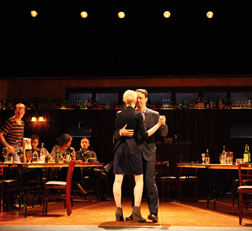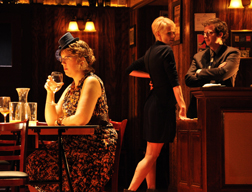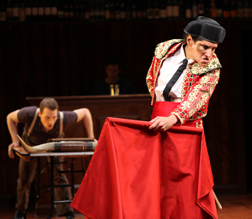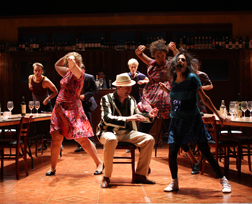By Lucy Komisar
The Elevator Repair Company’s often entertaining, sometimes puzzling parody of Ernest Hemingway’s 1926 novel was maybe not intended to be the second. But this production, which cuts but doesn’t change a word of the book, makes one wonder how anyone could have taken Hemingway seriously. Or maybe that’s a result of this hokey presentation of Hemingway’s lines.
It’s hard enough to pull a play out of a novel, but the troop decided, in its tradition, to take the exact text, though deleting some sections to bring down the running time to three-and-a-half-hours. As much as it fascinates to see the Hemingway novel on stage, one is struck by the fact that a reader’s imagination might have enriched it more than director John Collin’s literal staging. Unless the parody was deliberate.
Jake Barnes (Mike Iveson), the expatriate American hero, if one can call him that, is so understated and laid back that he appears to be commenting on events he is watching from the sidelines. Jake is a foreign correspondent. He types a lot. We hear the typing sound that continues, in clever quirky fashion, after he gets up from his desk. We don‘t ever find out who he works for or what he writes about.

Jake is desperately and humiliatingly in love with Brett Ashley (Lucy Taylor), the British aristocrat by marriage who keeps him on an emotional string even as she beds whatever interesting men come along. Jake’s problem, of course, may be that a war wound made him impotent, though this is never directly addressed by Brett.
In these post-war years in Paris, Jake and Brett pal around with other Brits and Americans who appear to spend most of their time swilling booze. They repair to famous haunts such as Le Select on the Boulevard Montparnasse at the southern border of the literary left bank. In fact, the main set is a bar created with two lines of marble top tables and painted wooden chairs that double as beds and other scenery required by the narrative. At the top of the dark wood-paneled wall is a high wrap-around shelf with dozens of bottles. By the end, you figure the characters will have emptied most of them. (The smart set is by David Zinn.)

Brett, a Brit whose divorce left her the title Lady Ashley, spends her time hooking up with attractive men. One is Robert Cohn (Matt Tierney), a rich American. Cohn’s girlfriend, Frances (Kate Scelsa), is an overweight lady who desperately wants to marry him and explodes in screaming fits that make you wonder why he would ever consider it. Another part of the ménage many is Mike Campbell (Pete Simpson), a Brit who is engaged to Brett and constantly refers to Cohn as a Jew.
These American and British expats live in Paris but travel around for amusement and perhaps to kill time. Albeit it was the days before product placement, Hemingway dropped in some famous restaurant names. In Paris, when they are not hanging out at Le Select, they are down the street at Le D´me or La Closerie des Lilas. In Spain, drinks are quaffed at the bar at Madrid’s Palace Hotel, and lunch is planned for El Botn with a menu of roast suckling pig and Rioja.
Occasionally boredom is relieved by engaging in some of Hemingway’s other favorite manly pursuits, going fishing or watching bullfights.

The bullfight scene is the best in the play. Susie Sokol dressed as the torero Pedro Romero takes on a table with horns that becomes the raging animal. The roar of the crowd is supplied by a sound mixer whose wood paneled cover suddenly falls away. (Sound is by Matt Tierney and Ben Williams.) Romero and a Spanish count (Vin Knight) have comic accents that replace the y with a j. You is juu.
The female characters reveal Hemingway’s misogynistic view of women – Frances is an unattractive hanger-on and Brett an attractive man-chaser and man-dumper. Kate Scelsa as Frances does a riotous over-the-top screechy monologue complaining about her boyfriend, Cohn. Matt Tierney is very good as the discontented American. Lucy Taylor is an enigmatic but charming Brett, and one understands how she could have attracted suitors who seem to wilt before her attentions.

If you can suspend belief in the text, you can enjoy director Collins’ very imaginative, vivid production, especially the bullfight and the jazzy French bar dance sequences, all enhanced by the music, sometimes jazzy, or ragtime, and the iconic bullfight sounds.
The Select (The Sun Also Rises). Based on the novel by Ernest Hemingway; created by Elevator Repair Service; directed by John Collins. New York Theatre Workshop, 79 East 4th Street (between 2nd and 3rd Aves), New York, NY. 212-460-5475; http://www.nytw.org. Opened Sept. 11, 2011; closes Oct. 9, 2011. Review on New York Theatre Wire.

